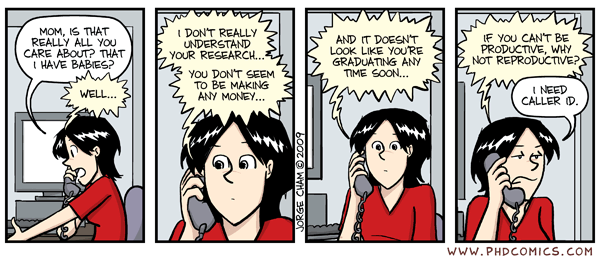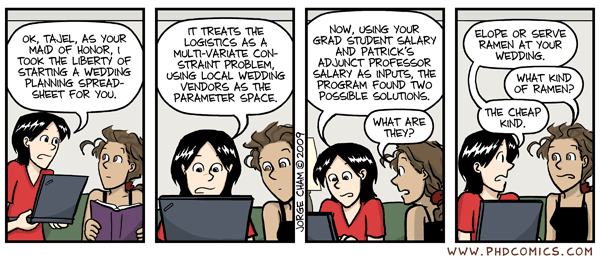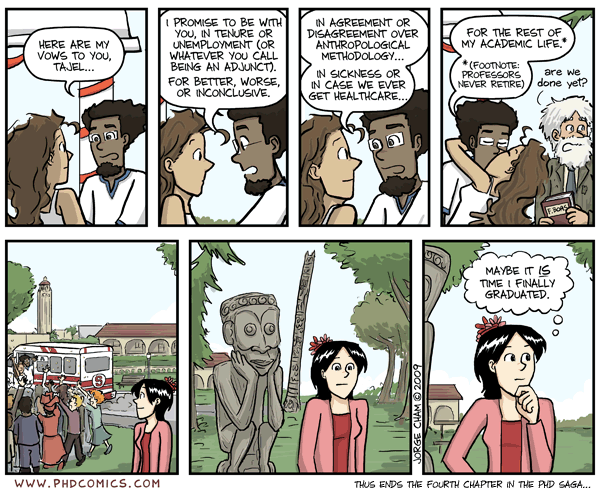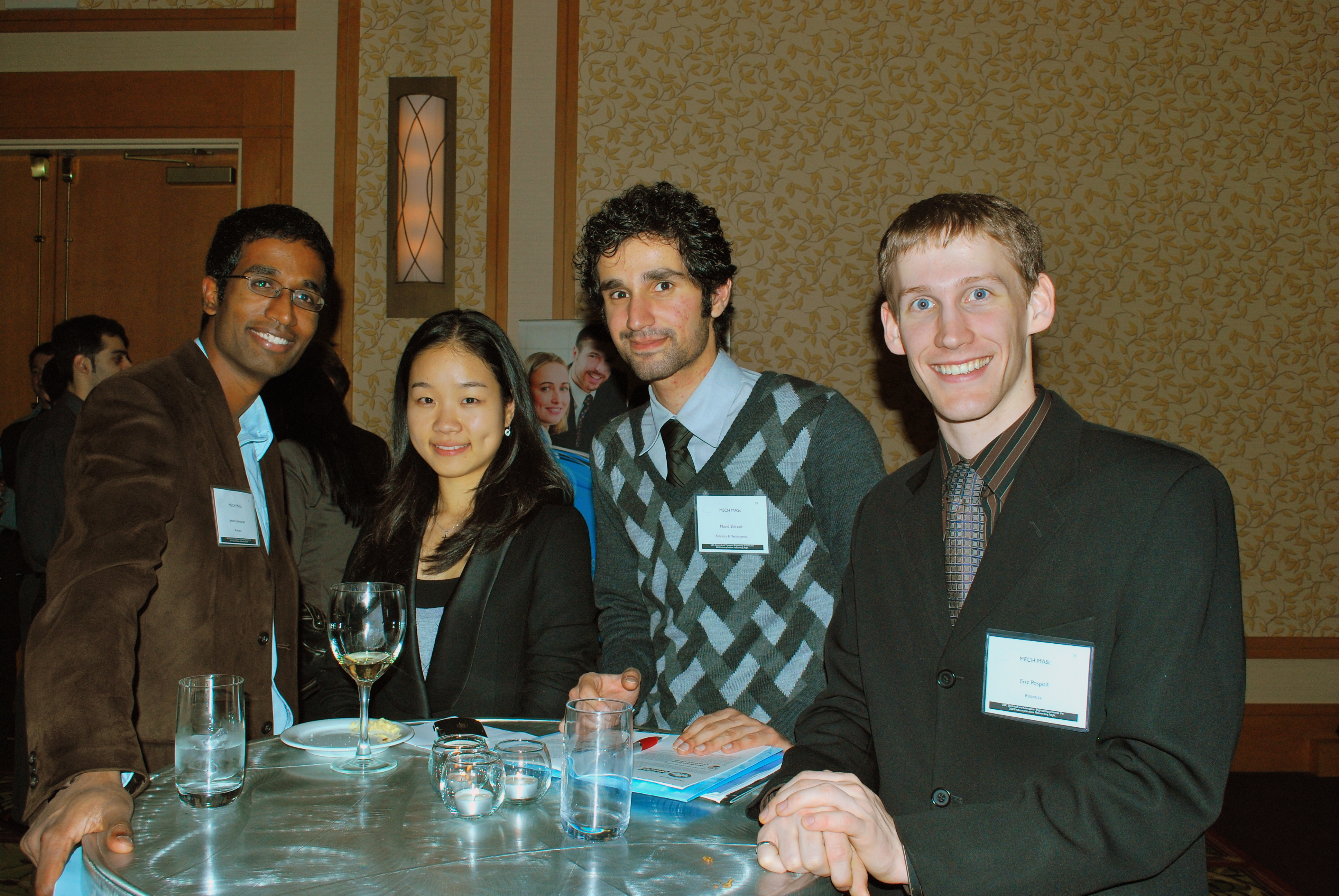Surprise surprise… I can’t get my work done. Again. Having zero productivity is not an option today, as I do have a lot I have to get done before this long weekend is over (oh, by the way, happy Canada Day!).
So I’m going to see if my magic trick works, and see if I can get myself some of that productive feeling by blogging about completely non-work-related things… eh hem..
I was initially planning to do a Part 3 on getting ready for grad school. But interestingly enough, more pressing things came up. Remember how I told you about me getting newspapers delivered to my door? Yeah. The newspaper led me to read things that I wouldn’t normally come across, such as the article that discusses today’s career women and how their lifestyle is not so in line with their biology (the clock, as they say). So this post is going to speak to and about female grad students, but I hope it gives you male grad students some perspectives as well.
Last week, I came across a number of articles that covered the topic of women, career, and relationships. The first one was a Globe and Mail interview article of Jessica Massa, the author of a book called “The Gaggle: How the Guys You Know Will Help You Find the Love You Want“. Yeah, the fact that I’m bringing up this article might make you think I’m just another (sugar coated) blogger who thinks love is so wonderful and is the most important thing in the world etc etc., and want to save all the poor single souls out there.
No.
Don’t worry. I think I’m a bit too old to be advocating for or believe in the existence of a prince charming or the dream guy.

As planned, I started reading the news and have breakfast super early in the morning to start my day... And yes, those are chopsticks with my eggs and bagel.
The article talked about how the meaning of dating changed, and how there seems to be this ‘gaggle’ that women keep around them. Gaggle, according to the author, seems to be a group of men women keep around without dating any of them. One guy could be around to fill your emotional needs, another guy for physical needs, and another for career needs etc. I found it interesting because that very idea seemed to allow a lot of women to go on living without dating anyone, and end up unmarried with not too many gaggle in the end as they grow older.
The only reason I am brining up this article is because of another article I read on the same day’s newspaper. It was titled “Baby Before Salary? That Might Not be a Bad I dea” by Judith Timson. This second article covered women’s issue of fertility and how today’s career women are not really given a good environment to have a child when it is ‘optimal’ for our biology to do so. It’s commonly known that women who give birth for the first time after they are 30 years of age have a greater chance of getting cancer (I read it somewhere, and now I can’t remember where I read it) and, gradually, women become less fertile after 25 or something. So I have read some things here and there that leads to me believe that it’s biologically advantageous to have your first born when you are between 25~30. But that’s when you are the busiest and getting all the resources necessary to take over the world.
What the article brings to light is that women with multiple degrees (grad students, MD/JD seekers included) never really finish their school work before hitting 25, and are usually done by the time they’re a bit before or after hitting the 30 mark. And if you’re a girl on your way to getting your doctoral degree and finish your PhD luckily and happily in time, let’s say around 28 or 29, then maybe you’ll consider having a child…
But, oh wait.

Baby? what baby? In the midst of fertility related discussions I had with my friends, I found myself gardening at home, taking care of them as my 'babies'. Yes, I know, kinda creepy, but organic veggies are nothing creepy.
Typically, the socially acceptable order of things is that you get married first, and THEN have your first child (possibly, nine months or more after the wedding day, as more traditional people would like it). So, let’s say that you finish grad school on your 29th birthday and, to make things go a little bit quicker since time is of the essence in terms of female biology, you decide to get married on that day as well. That would be one heck of a day for you I’m sure. With luck, you would perhaps get pregnant on your wedding night, and give birth to your first child about three months before you hit 30. I know it’s not like the time runs out on our 3oth birthday, but you get the point. And wow, what a busy schedule that would be for you.
You could perhaps be married before you finish grad school, but the story is still going to be very similar for you. Because chances are, you’ll want to avoid having to raise your first child and write your PhD thesis at the same time.
Oh, and unfortunately, if you went through the decades of schooling and degree-earning with the goal of becoming a faculty member, then you’re likely to have to face the fact that you should do a post-doc for a couple more years before your first day at the dream job. You are probably about 31 or 32 by then (again, if you’re lucky that is). If you didn’t have your first child after you PhD on your 29th birthday (as the scenario goes), and decided to wait until your first day as a faculty member on your 31st birthday, then “Yay, life!” to you on having your first child not too long after hitting the 30 mark.
Oh, but unfortunately, your dream job probably wasn’t just a professorship, but a tenure track position. So you’re probably gonna have to think again on your 31st birthday and decide whether you’ll be able to manage having your first child, while teaching undergrad classes, and doing all the other stuff that you’d probably have to do to secure your tenure. And I believe it takes another five years or something before a committee examines you (oh life is full of people judging your and examining your work~) and makes the call on whether you get to have your dreams come true.
If you reconsidered on your 31st birthday, and waited until the day you get your tenure to have your first child, then you’re probably in your mid 30’s. Hmmp. So that’d probably be the optimal time (perhaps not biologically, but career-wise) for you to have a child and have your dreams come true too. Yes, you might increase your chances of breast cancer (or whatever it is that I read earlier), but that’s for other people, right? You’ll never get sick, or have to go through surgeries when you’re in your mid 30s and healthy. “I’m healthy now,” you say, “so chances are, I’ll have a healthy baby, and a healthy me after having the baby too, AND have a dream career”.
Well… let’s think about that a little bit more, by discussing another article I read. It’s an article that was published by The Atlantic, titled “Why Women Still Can’t Have it All.” It was written by Anne-Marie Slaughter, a former director of policy planning at the State Department. The gist of the somewhat long and well-written article is that it’s hard to have it all, and it kinda sucks to be women in our generation because of what the society expects of today’s young women, myself included, and what it offers for them.
Ms. Slaughter mentions how, in today’s society, it’s kinda looked down upon if you give up your career, or take a long break from your job to take care of family. To say that women can’t have it all is like putting a knife through the earlier generation of feminists who have established the level of gender equality we have today and their efforts to demonstrate that women CAN do all those things that were typically thought as men’s jobs.
The reality of things is that it’s really hard to have it all because your job may not give you the flexible time you need etc. And it’s even more so for today’s generation because of the way money seems to flow.
An article by Sarah Shanfield on What it Means to Turn 25 Today (thanks Jenny for forwarding! :D) describes how turning 25 today is completely different from our parents’ generation. Back in the days, most people were married by then, with perhaps a couple of children already. I have friends who are the same age as me (yes, I’m still 25, although not for long) and are a dad/mom already. They got married quite soon after undergrad, and had their first child quite soon after that. But still quite a number of my friends are unmarried, still dating, or still single, wondering about what should come next and when that next thing should come.
Because the thing is, social expectations and stereotypical mindset of today’s women Ms. Slaughter describes is very much applicable to us. I would perhaps unconsciously consider someone to be rather ‘weak’ or something along that lines if she chooses to take a couple of years off after finishing her PhD to have a child and be a housewife and a mom for a little bit before continuing to pursue her dreams. “What a waste of talent”, I’d probably say. I think this ignorant build-up of unconscious judging is perhaps built up from being a woman in engineering and how, at least at the beginning, I felt like I had to prove myself everyday before I was proven to and respected by the guys down the road. So I think I have this bad habit of subjecting all women to be hard working, striving to be better than men. I don’t really feel the pressure of proving thing in the same sense any more, since I’ve come to terms with the fact that I love integrating different fields of science together, and it’s ok not to know the details of EVERYTHIHG better than all men in the world.
In today’s world, especially in the fast advancing fields such as engineering/robotics, taking time off could be a big disadvantage for you in getting back to where you left off. Because where you left off would then be “so~ couple of years ago,” and you won’t be seen as that ‘fresh out of grad school’ person who has the latest and the greatest firmware installed on her brain anymore.
If you watch Larry Smith’s inspiring TEDx talk on “Why you will fail to have a great career” he gives a very entertaining and convincing argument for why using human relationships (spouse/children) is not a good excuse for not pursuing your dream. If you have 15 minutes, please do watch it. It’s quite worth your time. But after having watched the TED talk and having read these articles, you might come to the conclusion that his target audience is perhaps male youngsters dreaming of a great career, and not so much for women. I mean as a woman, if you are pregnant, then you don’t really have any option, other than abortion, but to have the child — which probably will have immense implications on your road to the “dream job”. And human relations become reasons, rather than excuses, to hit the brakes on career.
I mean, dreaming of a great career or not, I think motherhood would come first if I ever get pregnant while in pursuit of my dream (which probably will be everyday, and forever). I would perhaps seek help from family members (hopefully my future husband, if I have one, will have more modern male identity and be willing to help out) and attempt to balance career and family life. But that approach would ONLY succeed given the right resources, such as having an understanding husband/parents/sibling(s) with stable enough finances to keep your and your child’s belly and self-esteem from growling.
How would it ever work if you are aiming to become a professor? When you are just finished your PhD in your late 20’s or early 30’s, then you won’t have the load of savings, house, or anything like that to give you financial stability while you look for a post-doc position or a faculty position. Back in the days of our parents’ they probably didn’t have much trouble saving up and keeping some emergency funds around them just in case they have a child and all of a sudden have to acquire baby stuff (just to throw in a relevant example here…). In our generation, a number of those who are working, and have been working since getting their BASc are still in a very hard save-up mode, some living with their parents (forget the stigma of living with parents and stuff. I think it’s a very economical and practical way that shouldn’t be discouraged), and some still looking for the job that’ll pay well and make them feel good about what they do.
Getting married and living with your spouse is financially beneficial as well. So if you’re in grad school and married or living with someone who also has a source of income, then cudos to you for getting ahead in the ‘getting married, having children, and not dying alone’ game, as well as the ‘savings account / mortgage’ game. But realize that it’s hard.
It’s going to be really hard to get everything the society expects of you, the highly educated and driven career woman. Today’s society expects highly educated women to be successful in their career paths and want them to remain so, such that our feminist ideal is upheld. It, mostly parents I guess, also wants us to be mothers at some point in our lives so that the developed countries will have kids who will be taxable labour in the distant future. It also makes us want to live a certain standard of living and makes raising a child during grad school out of question for most people from financial point of view – and that’s not to mention having a child as a single mother going through grad school, which is just unimaginable.
But I’m not saying the society and its expectations are to blame. Many career driven women I know, such as my friends, also DO want all of those things. For instance, I would love to be successful in my career, become a female role model to someone someday, become a great mother who can afford to pamper herself and her child/children sometimes, and be able to provide good education and learning environment for the child/children. But is that actually possible without loosing all my hair out of stress?
If you are a single female graduate student, what I am outlining for you may seem like the unfortunate and hidden fineprint you might’ve wanted to read before accepting the offer of admission. Don’t worry. You’re not alone — actually, I am not sure if that makes things any better, but oh well.
If you wish to be a “happy superwomen who is a mother, and a professor, and a wife” someday, then I wish you the very best of luck. Because, from what it looks to me, you will need a lot of luck.
You’ll need a lot of luck to find the right kind of job that will give you the flexible time you’ll need to raise your child, have a super duper husband who provides income and helps out with child raising and other chores around the house, to remain fertile enough when you finally have the right resources to start thinking about having your first child, give birth to a healthy first child even if you’re a bit older than other moms, and remain healthy even if your first birth maybe long after your optimal biological time has passed. Or, you could just adopt, which I think is a great option.
I am, by no means, interested or thinking about having a child at the moment. To me, today’s pace of grad school really isn’t cut out to allow for students to be moms at the same time, and I am too much of a career loving person to invest much time finding the right person, take my chances at getting married before I hit 30, or spend a significant amount of time on a little new born in any way. None of that really seems to fit with where I am headed and how the rest of my grad school experience will be like. I know that our previous generation has done it. There are tenured professors who are mothers as well as respected figures in their field. But I think the variables are a little bit different for our generation. And I am not saying this in a pessimistic way or a whiny way to say “the earlier generation had it easier than us,” ’cause I still don’t know how they managed to do it. It’s incredible what the early generation of female career women have provided for today’s generation. And, if anything, they had to live/fight through more stereotypes and gender inequalities, and lack of understanding employers etc than we probably would have to. But it really puts the society to question whether we can foster the dreams of to-be career women in a better way, so that it becomes more accepted to bring your child to your or your partner’s company/institute’s playroom, and it becomes normal for both male and female grad students to be parents during pursuit of phD without having to struggle for financial/academic reasons.
For now, when my friends think I am hung up on the romance game in any way and think I am a pessimist in the romance front, they try to cheer me on and say you’ll find someone.
But chances are, I will continue to work on weekdays and weekends at the lab voluntarily (i.e., not much of meeting new people); follow my dream by working hard at the lab, again; defend my dissertation about four years from now, which probably will not be the same day I get married, since I won’t have met much of anyone; happily look for a job, industry, academic, or otherwise, after getting my doctoral degree around 29 or 30 (yup, that would be four years from now); start meeting people, since I’d be kicked outside the lab by then anyway; date for x number of years if that happens to be the case, since you never know how many iterations these things will take; then realize that it’s just waste of time, since men my age would be married to or dating younger women by then anyway; and probably happily dedicate my life to the field doing research and not worrying about the fertility dilemma.
So far, my single life as a researcher feels pretty great not having to worry about in-laws nagging on me to have their grandchild(ren).




 Follow
Follow

